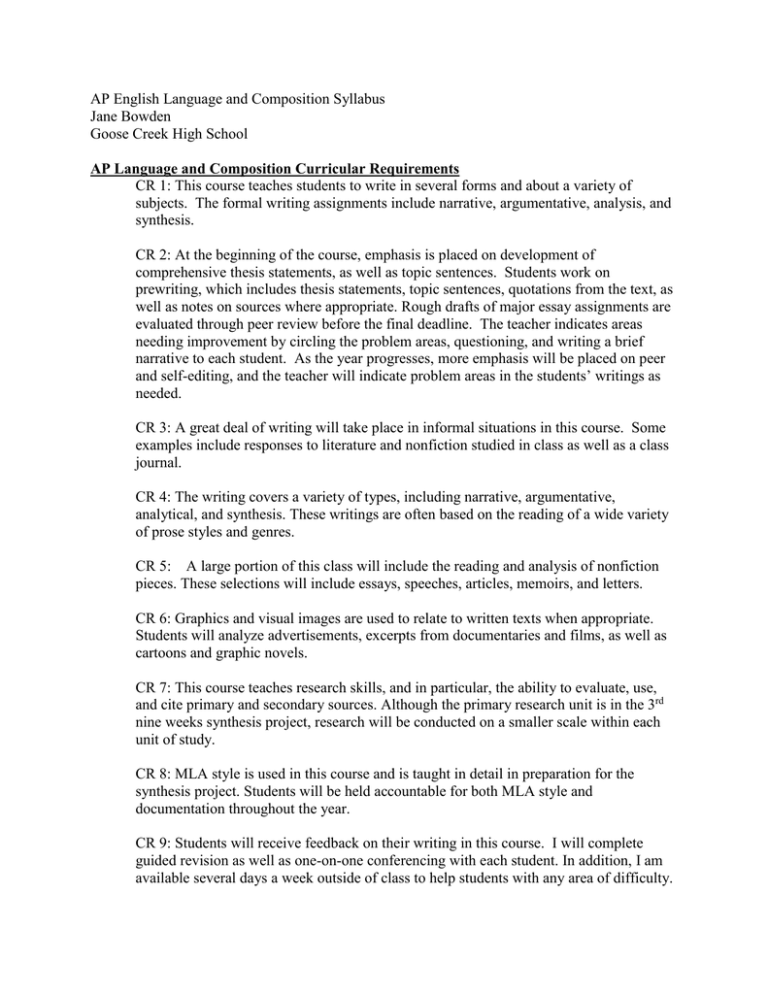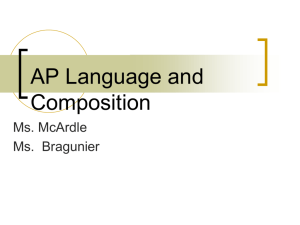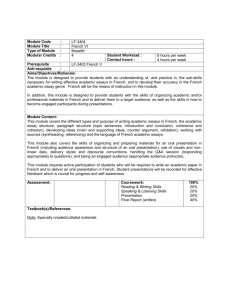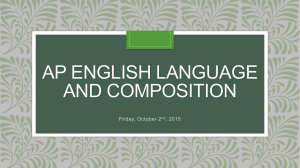AP English Language and Composition Syllabus Jane Bowden
advertisement

AP English Language and Composition Syllabus Jane Bowden Goose Creek High School AP Language and Composition Curricular Requirements CR 1: This course teaches students to write in several forms and about a variety of subjects. The formal writing assignments include narrative, argumentative, analysis, and synthesis. CR 2: At the beginning of the course, emphasis is placed on development of comprehensive thesis statements, as well as topic sentences. Students work on prewriting, which includes thesis statements, topic sentences, quotations from the text, as well as notes on sources where appropriate. Rough drafts of major essay assignments are evaluated through peer review before the final deadline. The teacher indicates areas needing improvement by circling the problem areas, questioning, and writing a brief narrative to each student. As the year progresses, more emphasis will be placed on peer and self-editing, and the teacher will indicate problem areas in the students’ writings as needed. CR 3: A great deal of writing will take place in informal situations in this course. Some examples include responses to literature and nonfiction studied in class as well as a class journal. CR 4: The writing covers a variety of types, including narrative, argumentative, analytical, and synthesis. These writings are often based on the reading of a wide variety of prose styles and genres. CR 5: A large portion of this class will include the reading and analysis of nonfiction pieces. These selections will include essays, speeches, articles, memoirs, and letters. CR 6: Graphics and visual images are used to relate to written texts when appropriate. Students will analyze advertisements, excerpts from documentaries and films, as well as cartoons and graphic novels. CR 7: This course teaches research skills, and in particular, the ability to evaluate, use, and cite primary and secondary sources. Although the primary research unit is in the 3rd nine weeks synthesis project, research will be conducted on a smaller scale within each unit of study. CR 8: MLA style is used in this course and is taught in detail in preparation for the synthesis project. Students will be held accountable for both MLA style and documentation throughout the year. CR 9: Students will receive feedback on their writing in this course. I will complete guided revision as well as one-on-one conferencing with each student. In addition, I am available several days a week outside of class to help students with any area of difficulty. Finally, all of my comments on graded assignments are geared toward revision. The portfolio at the end of the year showcases most of the graded writing assignments as well as student revision. Writing will be assessed using AP style scoring guides. These assessments will also include direct instruction on the following writing skills: Content, Organization, Voice, Word Choice, Fluency, and Conventions. 1st quarter—Introduction to Close Reading and Rhetoric Lessons will include the following: Definitions and examples of rhetorical devices Parallelism and repetition Allusions and analogies Embedding quotes Introduce SOAPS (Subject, Occasion, Audience, Purpose, and Speaker) Evaluating rhetoric in advertising CR6 Everything’s an Argument Chapter 13 (Style in Arguments) and Chapter 1 (Everything is an Argument) Multiple Choice AP passages Anonymous Paper Swap and Peer Revision CR9 Grammar, Usage, and Mechanics Documenting using MLA format CR8 PSAT Prep Writing Assignments—CR1 Major multi-draft essay topic—Narrative essay with an epiphany (This assignment is used primarily for diagnostic purposes.) CR2 Your assignment is to write a personal narrative about an epiphany you have experienced. You may write about any event or moment in your life in which you had a suddenly realization about the essence, truth, or meaning or something (exceptions: you may not write about Santa Claus, the Easter Bunny, the Tooth Fairy, or any other similar character or story—be original and write about something that is unique to you!). Choose something that you remember well and that is meaningful to you. Timed writings and student examination of sample essays—Focus on argument. CR4 Years of AP questions and topics will include several of the following: Reading selections will include several of the following: CR5 Nonfiction Abraham Lincoln “Gettysburg Address” John Donne “No Man is an Island” Ronald Reagan “Challenger Speech” Elie Wiesel “Nobel Prize Acceptance Speech” Markus Zusak The Book Thief Thomas Paine “The Crisis” Chief Joseph “I will fight no more forever” Winston Churchill “We shall fight them on the beaches” Fiction Walt Whitman “When Lilacs Last in the Dooryard Bloomed” Zora Neale Hurston Their Eyes Were Watching God 2nd quarter—Deepening Appreciation of Rhetorical Strategies; Introduction to Analysis Lessons will include the following: Everything’s an Argument Chapters 2, 3, & 4 Introduce Logos, Ethos, and Pathos Multiple Choice AP passages Rhetorical Précis Allusions, foreign phrases, and literary terms Grammar, usage, and mechanics Using primary and secondary sources CR7 MLA format CR8 Anonymous paper swap and Peer Revision CR9 Writing Assignments—CR1 Students will write in both informal and formal contexts to gain authority and learn to take risks in writing. Journal keeping, collaborative writing, and multi-draft revised essays will all be a part of the AP Language class. All classes will begin with the reading of the class journal. CR3 Major multi-draft essay topic—Rhetorical analysis of a speech. Students will select a speech that we haven’t studied in class and write a well-organized and well-written analysis of the speaker’s rhetoric. CR2 Timed writings and student examination of sample essays in the 2nd quarter will focus on analysis. CR4 Reading selections will include several of the following: CR5 Nonfiction Martin Luther King “Letter from Birmingham Jail” Abraham Lincoln “Address in Independence Hall” Feb 1861 Frederick Douglass “What to the Slave is the 4th of July” Malcolm X “The Ballot or the Bullet” Video “The Life and Times of Nelson Mandela” www.nelsonmandela.org William Ernest Henley “Invictus” Theodore Roosevelt “The Man in the Arena” Alice McGill Molly Bannaky CR6 Fiction Alan Paton Cry the Beloved Country Excerpt from film Invictus CR6 3rd quarter—Understanding and Developing Synthesis Lessons will include the following: Multiple Choice AP passages Allusions, foreign phrases, and literary terms Grammar, usage, and mechanics Using primary and secondary sources CR7 Anonymous paper swap and Peer Revision CR9 Focus on research will include activities from Part IV of Everything’s an Argument (Finding Evidence, Evaluating Sources, Using Sources, Plagiarism and Academic Integrity, and Documenting Sources) CR7 Timed writings and student examination of sample essays—Focus on synthesis (Question 1 on AP exam) CR4 Writing Assignments CR1 Students will write in both informal and formal contexts to gain authority and learn to take risks in writing. Journal keeping, collaborative writing, and multi-draft revised essays will all be a part of the AP Language class. Timed writings and student examination of sample essays in the 2nd quarter will focus on synthesis. CR4 Casebook— Contemporary life is marked by controversy. Choose a controversial local, national, or global issue with which you are familiar. Create your own synthesis question. Then, you will research this controversy. Gather a variety of sources, including written, auditory, or visual that address this topic. Make sure that you include a variety of opinions as well as a variety of sources. CR6, CR7 Annotated bibliography—Complete an annotated bibliography in MLA format, including summary and evaluation of each source. CR8 Essay on synthesis topic— Then, using appropriate evidence, write a well-organized and well written essay that carefully considers the opposing positions on this controversy and proposes a solution or compromise. CR2, CR4 Reading selections will include several of the following: CR5 Nonfiction Stephanie Hanes “Little Girls or Little Women? The Disney Princess Effect” p 482 Skip Hollandsworth “Toddlers in Tiaras” p 490 Jack Shakley “Indian Mascots—You’re Out!” p 520 Michael Martinez Chicago Tribune “Yuma High School Criminals” Eric Mortenson “A Diversified Farm Prospers in Oregon’s Willamette Valley” p 691 Christopher Pelletier “The Locavore’s Dilemma” p 703 Lisa W. Foderaro “The Well-to-Do Get Less So, and Teenagers Feel the Crunch” p 823 Laurence Shatkin “Education Pays, but Perhaps Less Than You Thought” p 854 John Marsh “Why Education is not an Economic Panacea” p 912 Fiction Selections from Khaled Hosseini Poetry from www.rawa.org. 4th quarter Understanding and Developing Argument; Focused Preparation for AP exam, and applying to college Lessons will include the following: Multiple Choice AP passages Allusions, foreign phrases, and literary terms Grammar, usage, and mechanics Satire Making a visual argument: Cartoon and Stereotypes (p 531-534 in Everything’s an Argument) CR6 Using primary and secondary sources CR7 Anonymous paper swap and Peer Revision CR9 Writing Assignments CR1 Students will write in both informal and formal contexts to gain authority and learn to take risks in writing. Journal keeping, collaborative writing, and multi-draft revised essays will all be a part of the AP Language class. Timed writings and student examination of sample essays in the 4th quarter will focus on final preparation for the AP exam. All classes will begin with the reading of the class journal. CR3 Major multi-draft essay—Students will complete an essay for a college application. These essays will be based on the Common Application which is available online. (www.commonapp.org) CR2 Timed writings and student examination of sample essays—Focus on all three questions (Argument, Analysis, and Synthesis) Topics covered will be selections listed above that weren’t covered in the previous three quarters. CR4 Reading selections will include several of the following: CR5 Nonfiction “Big Brother versus Little Brother” and “Little Brother is Watching” http://learning.blogs.nytimes.com/2010/10 Mark Twain “The Presidential Candidate” Jonathan Swift “A Modest Proposal” William Lutz. “Doublespeak.” Fiction George Orwell 1984 Shelley, Percy Bysshe “Ozymandius” Yeats, William Butler “The Second Coming.” A 20th century novel of the students’ choosing (with teacher and parent approval) Student Evaluation--Students will be evaluated on the basis of major papers, homework, quality and character of class participation and involvement, quizzes on readings and lessons, and AP style writing prompts. The class will meet every other day on the A/B schedule throughout the school year. The grading scale in Berkeley County Schools is as follows: A 93-100 D 70-76 B 85-92 F 0-69 C 77-84 Within the course, the percentages toward the final grade will be as follows: Daily work = 20 % Quizzes and minor projects = 30 % Major grades =50%





